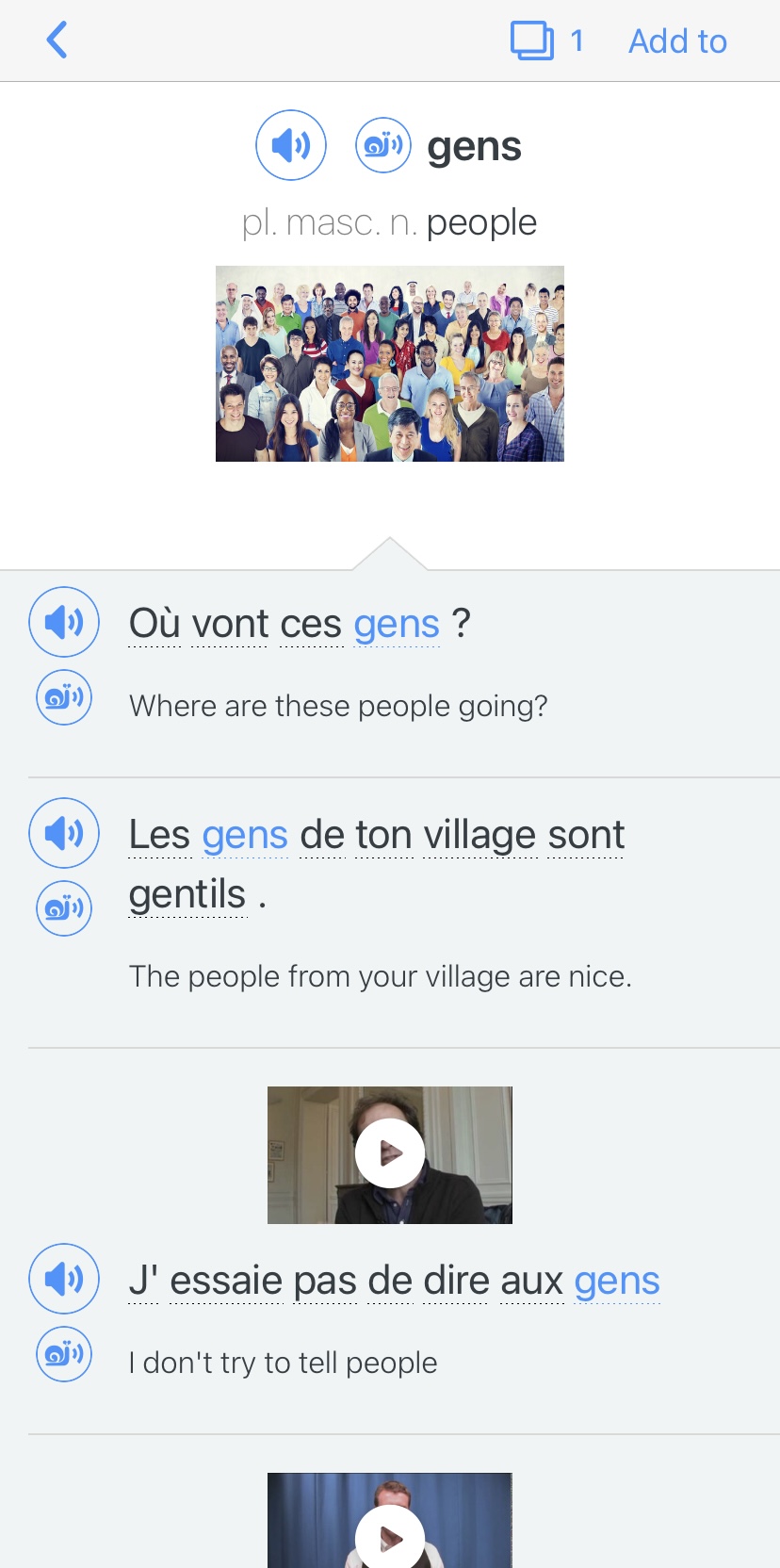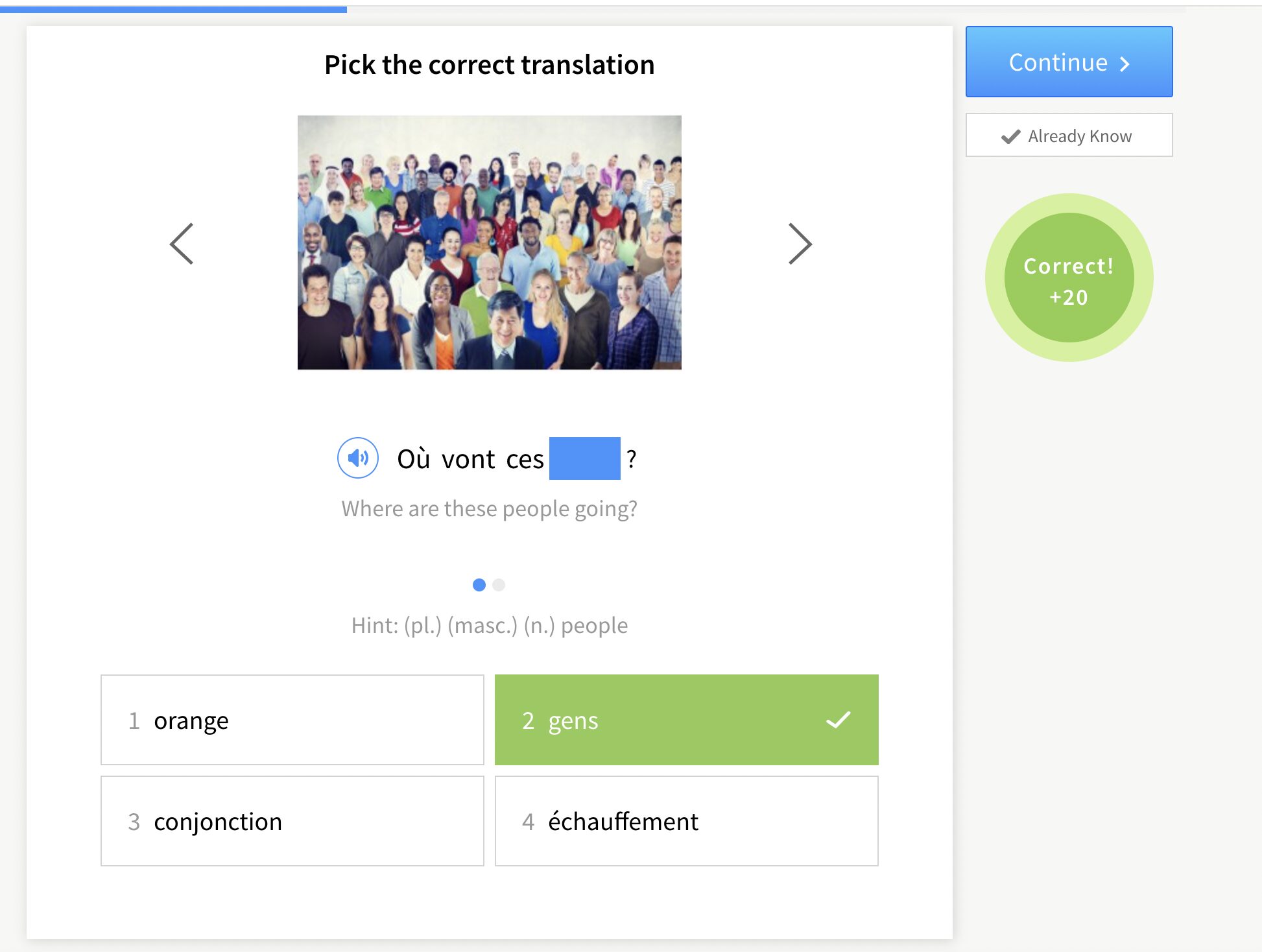Contents
- 1. Make Small Progress Every Day
- 2. Practice the Four Main Language Skills Equally
- 3. Continue Actively Building Your Vocabulary
- 4. Make Use of Digital French Resources
- 5. Don’t Forget About Traditional Learning Methods
- 6. Practice Effectively with a Multisensory Approach
- 7. Talk in French with Native Speakers
- 8. Remember to Change Up Your Routine
- 9. Do French Immersion at Home
- 10. Travel to a French-Speaking Country or Region
- What Does “Being Fluent” Really Mean?
- And One More Thing…
How to Become Fluent in French

Learning French to full fluency can be an incredibly rewarding experience. But achieving fluency requires a balanced approach that mixes consistent practice, diverse learning methods and immersion.
I’ve outlined 10 practical tips that will help you improve your French vocabulary, speaking, listening, reading and writing skills. By following these strategies, you’ll make steady progress toward mastering the language at your own pace.
Download: This blog post is available as a convenient and portable PDF that you can take anywhere. Click here to get a copy. (Download)
1. Make Small Progress Every Day
Short study time doesn’t equate to ineffective study time. In fact, there are studies that show that language micro-learning (studying a language in short sessions) can be more beneficial and efficient than long study sessions.
But there’s one important rule: You have to be consistent.
So, set your big French fluency goals first, then set smaller goals for yourself every few days, weeks or months. Do something small every day to help you achieve them:
- If your goal is to finish a French book, determine how many pages you need to read each day before your goal day.
- To work on your reading comprehension, read a French newspaper article every day.
- For listening comprehension, listen to a podcast or some French-language tunes during your morning commute.
- If you want to watch a French movie, commit to watching five minutes each day.
Small steps and changes in your habits are the best way to get big results.
2. Practice the Four Main Language Skills Equally
In the same way that you exercise different muscle groups to ensure that all parts of your body get stronger, so should you pay close attention to your four French “muscle groups.”
Language learning can be divided into four main skills:
- Reading
- Writing
- Listening
- Speaking
A bonus category would be culture—if you’ve ever traveled to France, you’ll understand exactly how important it is to know about French culture, customs and etiquette.
When you’re working on your French, be sure to exercise each of these skills equally.
You can join a French conversation group to practice speaking; listen to French podcasts to give your ears a workout; write in French and have your work corrected by a native speaker; read French books and complete reading comprehension exercises; and so much more!
Also, if you’re using the right resources (more on this later), learning about French culture and customs will happen naturally as you strengthen your main language skills.
Divide your time as best you can to make sure that all portions of your French learning experience are being practiced.
3. Continue Actively Building Your Vocabulary
A wide and varied vocabulary is essential for becoming fluent in French.
Push yourself to learn new words, whether you find them in a podcast, a news article or even a conversation with a friend.
Consider what kind of words would be helpful for you to learn that you don’t already know. For example, do you know connectors and filler words in French?
These kinds of words make speech more fluid and smooth. They allow us to create longer sentences and express thoughts in a more precise way. They even make us sound more native-like when we use them in a language that’s not our own!
Here are some of my personal favorite French connectors and French filler words:
- Alors (So, then)
- Enfin bref (Long story short, anyway)
- Tu sais (You know)
- Genre (Like)
- Ainsi que (As well as)
- Bien que (Even though)
- Quoi que (No matter what)
- Donc (Therefore)
The great thing about learning new vocabulary is that even on days when you don’t have hours to devote to your French studies, you can do learning that counts towards your fluency dreams.
You can:
- Use flashcards to memorize vocabulary words quickly and easily. You can make your own flashcards, buy them online or use a flashcard app.
- Fold a paper into columns, then write the French words in one column and the English in the other. You can then study in much the same way as with flashcards, or test your ability to write out the French by looking at the English.
- Practice with a study buddy and race to see how many words you can each name in a given category. Alternatively, you can play a version of Boggle together, making as many words as possible from a given number of random letters.
- Find a French vocabulary builder you like for a fun, contextualized way to learn and study new words.
4. Make Use of Digital French Resources
We live in the era of the internet. Take advantage of it!
Virtual language learning resources are easily available for many people, and they can make the journey to French fluency both simpler and more enjoyable.
For instance, apps for learning French are extremely popular because they can be taken with you everywhere you go. Many even come pre-packaged as micro-learning lessons for those of us who only have a few minutes to study at any given time.
Maybe five minutes alone won’t do much for your French fluency, but four 5-minute micro-sessions a day on a good app is 20 minutes of fun learning that’ll surely help you in the long run!
Another digital resource very commonly used by language learners is online courses.
There are literally thousands of options, from general conversation and grammar courses to more specific ones like French for hotel workers or the French subjunctive.
If you want to boast about having studied in one of the “big universities,” you can always enroll in a MOOC (Massive Open Online Course)—which are (usually free) courses on any topic imaginable offered by universities from all around the world.
There are tons of MOOCs for learning French, as well as those aimed at native French speakers. Choose the perfect one for you and, if you want to, you can often pay a little extra to get a certificate after you complete it.
5. Don’t Forget About Traditional Learning Methods
Although digital learning resources are plentiful and convenient, sometimes we favor these simply for their new-ness…and at the expense of more “old-school” techniques that still work just as well.
Even if you haven’t done homework in years, perhaps getting back to the classroom could be your best option for working towards fluency!
Being in a classroom with an actual teacher to answer questions and other classmates with whom you can share the experience might be just the push you need to really advance your language abilities.
Plus, classroom learning can help ensure you learn the proper pronunciation, vocabulary, grammar and conjugations—all key to eventually becoming fluent in French.
Availability of French courses varies by location, so here are some ideas to help you find one more easily:
- Your local college/university
- Continuing studies programs
- Language schools
- Immersion schools/camps
And, whether you decide to take an in-person course or not, I strongly recommend having at least one good book for learning French.
You can obviously choose a French textbook, but there are additional options you may want to consider as well:
- A French grammar book will be helpful if your goal is to sit an official exam or get any kind of office job in a French-speaking country. It may sound boring, but grammar is essential for being a proficient user of the language.
- A French workbook is great if you enjoy drills and repeated actions like me. Workbooks allow you to practice the same concept repeatedly so you can see words and grammar rules in different contexts.
- A French phrasebook is ideal for anyone learning French just to be conversational, or to travel in French-speaking regions. One of my students even created his own phrasebook with the flashcards he’d made in class!
- French children’s books or French comic books are great for visual learners. You might be surprised how much you can learn from a book that’s been created to entertain!
- A bilingual book is helpful for those who like to learn with translations. Learning with authentic text created for native speakers is often difficult in the beginning, but you can work your way up through bilingual graded readers as well.
- A French dictionary is my favorite option. Depending on your level, you can have a bilingual dictionary or a monolingual one in just French. Reading through the book can help you practice reading, vocabulary, grammar and pronunciation!
6. Practice Effectively with a Multisensory Approach
The multisensory approach to learning is using more than one sense while you’re learning.
I’m sure you’ve done this many times without even realizing it. If you’ve ever watched a movie with subtitles, you were using hearing and sight to listen and read at the same time.
Learning French in this way allows you to use different channels to receive the information. For this reason, by the end of a multisensory study session, you’ll likely remember more French than if you studied “traditionally”!
Receiving information through different channels at the same time forces us to go from passive to active learners. This means we’re normally more engaged when we’re learning, and as a result, we learn more efficiently.
The beautiful thing about this method is that you can create your own ways of engaging different senses while you study. Some ideas you can use, expand and make your own are:
- Listen to a French podcast while reading the transcript.
- Read a book in French while listening to the audiobook version.
- Watch a movie in French with French subtitles. This could even be a French-dubbed movie, like “Le Seigneur des Anneaux (The Lord of the Rings)”:
- Watch a short video (ideally without speech) and explain it to yourself in French out loud, in writing or simply in your mind.
- Do dictations by writing what you hear as you listen to French audio.
- Follow a French recipe using a cookbook, a YouTube video or a kitchen channel on TV. Name the ingredients in French and engage your senses of smell and touch. After, eat what you’ve prepared and think or talk about it in French.
- Listen to songs in French and read through the lyrics. You can even try singing along!
- Do an art activity (by yourself or with your kids, friends or family) and only speak in French while doing it.
7. Talk in French with Native Speakers
If you really want to know how to become fluent in French, this tip may just be the most helpful one yet.
That’s because the only way to truly know what level you have obtained is to speak and converse with people who know French.
A popular option is finding a French language exchange partner. You’ll help them by speaking together in your native language, and they’ll help you by chatting in French. You can even have multiple language partners for additional practice!
There’s also the option of simply talking to French friends (who don’t want to practice your language) or even dating a native French speaker.
Having any kind of relationship with a native (especially if they have poor English) will put your hard work to the test. You’ll only have yourself and your language skills to fall back on.
I recommend meeting up once or twice a week. Make sure to prepare several topics that interest both of you, and don’t forget to ask questions. You might even consider this a “lesson” and offer to pay a reasonable rate for the meetings.
If you don’t know any French speakers yet, don’t fret. There are French language and culture groups all over the world, so chances are good there’s one somewhere near you.
Here are a few options for finding a French group for practice:
- French Tables: Lots of cities and universities around the world have a weekly or monthly “French Table” that allows students and natives to join over drinks, potlucks or group activities to speak French. Research what’s available in your town and sign up!
- Meetup Groups: This is a great option no matter your level of French. Visit the site I just linked, type in your zip code and then search for “French” to find events near you.
- Alliance Française: Another great option is checking out the events calendar from your local chapter of Alliance Française. Besides French courses, you’ll discover fun events throughout the year, from storytelling and book clubs to nights on the town.
All of this may sound intimidating. But if you start attending a regular French conversation group, you’ll realize you had nothing to be afraid of. You’ll probably even make some new friends! Plus, this will absolutely skyrocket your French speaking skills.
8. Remember to Change Up Your Routine
At the gym, most professionals suggest switching up your routine a few times a month or every several workouts to keep your body guessing. Otherwise, you get too used to what you’re doing and it doesn’t have the same effect as it did at the beginning.
The same is true of French. Don’t forget to spice things up a little bit every once in a while!
If you start by reading an article on a French website every day, the first day may be hard, but every day after that will get easier.
If you started with Yahoo France, you can step it up a notch by changing to Le Monde after a few weeks to give your brain a bit of a shock and some fresh content and new writing styles.
If you’ve been listening to the same podcast for a few weeks, choose a new one that’ll give you a new voice and accent to get used to.
Do you have a speaking partner? If you’ve been meeting with the same person for a while, consider finding another one!
At the very least, change up the meeting place for your conversations so that new vocabulary words become necessary. For example, visit a museum with your conversation partner and discuss art in French.
Little changes to your routine are the best way to make sure that you keep learning new things as time goes on.
9. Do French Immersion at Home
Immersion is one of the most effective ways of learning a language, but not all of us can afford a trip abroad.
The solution? Create a mini French-speaking “country” at home!
You don’t need to spend a lot of money or even leave your city to immerse yourself in the French language. There are a ton of ways in which you can add French to your life and feel as if you live in France or Canada.
For example, you can:
- Stick post-its to objects around your house to learn new vocabulary.
- Change the language of your electronic devices and social media to French.
- Surf the internet in French, and (if possible) only engage with others online in French.
- Attend events, meetings and parties for the local French community.
- Find a conversation partner who’s a native French speaker and call them regularly.
You can also journal in French, or do your best to think in French—a true test of fluency!
A really great way to practice at-home language immersion is with the media you consume. You can find and use:
- French apps
- French news
- French TV shows
- French movies
- French songs
- French radio
- French podcasts
Using YouTube can also be a key step towards French fluency. Just make sure the content you’re absorbing is native, educational and entertaining!
One way to ensure you’re doing home immersion right is with a program like FluentU. Through the program, you can learn through native French content such as “Au Service de la France”:
FluentU takes authentic videos—like music videos, movie trailers, news and inspiring talks—and turns them into personalized language learning lessons.
You can try FluentU for free for 2 weeks. Check out the website or download the iOS app or Android app.
P.S. Click here to take advantage of our current sale! (Expires at the end of this month.)
10. Travel to a French-Speaking Country or Region
To become fully fluent, you’re going to have to get your feet wet… by jumping the Atlantic or crossing the border, that is.
Maybe you’ve been doing at-home immersion for a while and you’re ready for the next step. Or maybe you’ve just been dreaming of visiting the City of Light yourself.
No matter your situation, one of the best ways to become fully fluent in another language is to live in (or at least travel to) a country that speaks it. If you’re serious about French fluency, consider a long trip to French-speaking Canada or to France.
Depending on what your lifestyle allows, you may wish to spend a few weeks to a few months in a foreign country.
When opting for a shorter journey, choose a trip that’ll allow you to make the most of your time there. Many programs, particularly in France, allow learners to sign up for intensive language courses lasting around three hours per day.
After class is over for the day, you often have the choice of exploring the new city on your own or signing up for another class, perhaps a more specialized one. You might take a course to learn how to paint, cook or knit alongside locals. Not only will this increase your vocabulary, but you’ll also meet new people with whom you can share your thoughts in French.
If you decide to opt for a longer trip abroad, you’ll be able to see what it’s really like to live in another country and another language. You can do so legally and economically with a language course, but you might also consider working as an au pair or volunteering through an organization like HelpX.
Note that many expatriates find it easy to spend time with fellow expats, but try to avoid falling into this trap. Spend time with as many native French speakers as you can to get the most out of your stay.
And keep in mind that while France and Canada are the most well-known locations for studying French abroad, they’re certainly not the only ones who speak the language.
Here are a few more tips for making the most out of your time in a French-speaking country:
- Research the culture. That way you’ll know how to be respectful in your actions, words and attire. It’ll also make you more curious and appreciative of the place you’re staying.
- Make friends who speak French. I just mentioned this, but it’s seriously worth repeating! It’s so easy to seek out others who are in similar situations as yourself, but befriending locals will do the most for your French fluency goals.
- Get a French-speaking roommate. Seek out housing options with locals if possible. This is a great way to force yourself to speak French every day—and probably make a new friend in the process!
What Does “Being Fluent” Really Mean?
The Merriam-Webster dictionary defines fluent as being “capable of using a language easily and accurately.”
While this isn’t a very thorough definition, my guess is that the majority of language students have a similarly vague way of looking at fluency.
As a language teacher who’s been teaching for almost two decades, I believe defining language fluency is much more complex. For the sake of space and time, let’s say:
A fluent speaker of a language is someone who is able to produce (i.e. speak and write) and understand that language with ease.
The problem with fluency is that it can mean very different things depending on the person.
For instance, consider two of my students:
- Karol: He wanted to become conversational in French, so he started devouring French podcasts and media, though he studied close to zero grammar. His level of French is now where we can easily converse on the ethics of the death penalty… but he makes a bazillion grammar errors along the way.
- Ania: She’s on a mission to pass the C2 DELE exam in Spanish, so she knows she has to be grammatically perfect and have a vocabulary close to that of a native speaker, but she’s having difficulties with some higher-level concepts.
Karol feels he’s achieved fluency in French because he can communicate easily and say everything he needs to say without having to think too much.
Ania, on the other hand, doesn’t think she’s fluent at all because she’s struggling with the subjunctive, but she makes way fewer mistakes than Karol.
Between Karol and Ania there’s a whole continuum of degrees of fluency, and all of them are valid!
I’ve put together a list of some traits that I personally think are good indicators that a person is fluent in a language, so you can assess yourself and see where you are in the “fluency continuum.”
For me, a fluent language learner:
- Is able to communicate their thoughts in the target language easily (without having to think too much).
- Is able to use their target language to define words they don’t know.
- Is able to think in their target language (and not only when they’re using it).
- Feels comfortable using their target language.
- Can understand their target language.
- Can learn their target language in their target language.
- Can be understood by native users of their target language without issues.
Remember that “fluency” is very subjective, and your definition of fluency may be different. In fact, I encourage you to consider exactly what it means for you personally to be fluent in French!
Whether you just want to be conversational or a fully proficient user of French, fluency is attainable!
No matter your ultimate goals, the steps for how to become fluent in French are the same. Follow the 10 simple tips and techniques above and you’ll be well on your way.
Download: This blog post is available as a convenient and portable PDF that you can take anywhere. Click here to get a copy. (Download)
And One More Thing…
If you’re like me and prefer learning French on your own time, from the comfort of your smart device, I’ve got something you’ll love.
With FluentU’s Chrome Extension, you can turn any YouTube or Netflix video with subtitles into an interactive language lesson. That means you can learn French from real-world content, just as native speakers actually use it.
You can even import your favorite YouTube videos into your FluentU account. If you’re not sure where to start, check out our curated library of videos that are handpicked for beginners and intermediate learners, as you can see here:
FluentU brings native French videos within reach. With interactive captions, you can hover over any word to see its meaning along with an image, audio pronunciation, and grammatical information.
Click on a word to see example sentences and other videos where it's used in different contexts, then add it to your flashcards. For example, if I tap on the word "gens," this is what pops up:
Want to make sure you remember what you've learned? We’ve got you covered. Each video comes with exercises to review and reinforce key vocab. You’ll get extra practice with tricky words and be reminded when it’s time to review so nothing slips through the cracks.
The best part? FluentU tracks everything you’re learning and uses that to create a personalized experience just for you. Start using the FluentU website on your computer or tablet or, better yet, download our app from the App Store or Google Play.
Click here to take advantage of our current sale! (Expires at the end of this month.)























